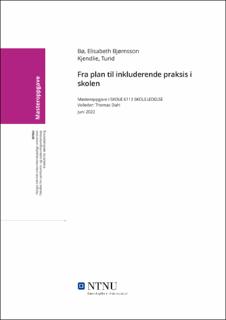| dc.contributor.advisor | Dahl, Thomas | |
| dc.contributor.author | Bø, Elisabeth Bjørnsson | |
| dc.contributor.author | Kjendlie, Turid | |
| dc.date.accessioned | 2022-10-13T17:19:44Z | |
| dc.date.available | 2022-10-13T17:19:44Z | |
| dc.date.issued | 2022 | |
| dc.identifier | no.ntnu:inspera:116464037:49503121 | |
| dc.identifier.uri | https://hdl.handle.net/11250/3025997 | |
| dc.description.abstract | I denne studien har vi undersøkt hvordan planer og ideer om inkluderende undervisning finner veien inn i skolens praksis. Ønsket om en inkluderende praksis står sentralt i nasjonale og lokale styringsdokumenter. På bakgrunn av dette, har vi sett nærmere på hvordan en kommune og en skole i kommunen har arbeidet med å realisere en plan for inkluderende praksis. Vi har vært opptatt av prosessen fra plan til praksis. Studien bruker case som forskningsdesign for å kunne gå i dybden på dette arbeidet i en lokal kontekst. Studien bruker aktør-nettverksteorioptikk for å kunne utforske de ulike aktørenes rolle og virke.
Vi har funnet at i arbeidet for en mer inkluderende praksis fra en kommunal plan og ut i skolen er det mange aktører involvert. Noen aktører har en betydelig større rolle enn andre. Vi fant også at ikke alle ansatte er aktører i de profesjonelle nettverkene.
Studien vår viser til problemene med å omsette kommunale planer når sentrale begreper ikke er omforent verken teoretisk eller i styringsdokumentene. Det gjør arbeidet med å sette planene ut i praksis utfordrende. Manglende begrepsforklaring gir handlingsrom for skolen. Samtidig vanskeliggjør denne friheten translasjonsprosessen for aktørene som møter begrepet, og begrepet endrer form etter hvilke aktører det er i relasjon med. Uten en felles begrepsavklaring vil implementeringsarbeidet kunne ta lenger tid.
Vi ser også at det er utfordringer knyttet til arbeidet med å nå frem til de ansatte som er nærmest eleven.
Vi har funnet at praksis handler mye om spesialundervisning og ordinær undervisning fremfor full inkludering. Det var ikke en bred forståelse av inkluderingsbegrepet.
Translatørkompetanse er en kritisk faktor i implementeringsfasen. Translasjonene av styringsdokumentenes visjoner og planer skjer på flere arenaer og ulike steder når ideene skal kontekstualiseres inn i en bestemt skolekontekst. Aktørene er oversettere av planene og har innvirkning på hvordan plan blir satt ut i live. Når et sentralt begrep som inkludering ikke er omforent i praksis, blir det mange ulike og til dels sprikende translasjoner.
Planer, som i vår studie, kan inneholde ideer om ulike aktørers rolle. Plandokumenter ser ut til å ha vansker med å nå ut over ledergruppen og ressurspersoner i skolen. Når skoleeier i tillegg legger føringer på skoleledelsen om andre oppgaver, kan føre til at forankringen glipper allerede på skoleledernivå og at det pedagogiske personalet får lite eierforhold til både prosessene og dokumentene. | |
| dc.description.abstract | In this study, we have examined how plans and ideas for inclusive education find their way into school practice. The desire for an inclusive practice is central to national and local governance documents. Based on this, we have looked more closely at how a municipality and a school in the municipality have worked to realize plans for inclusive practice. We have been concerned with the process from plan to practice. The study uses case as a research design to be able to go in depth on this work in a local context. The study uses actor-network theory optics to be able to explore the role and work of the various actors.
We have found that in the work for a more inclusive practice from a municipal plan and into the school, many actors are involved. Some actors have a significantly larger role than others. We also found that not all employees are players in the professional networks.
Our study refers to the problems of implementing municipal plans when key concepts are not agreed upon either theoretically or in the management documents. This makes the work of putting the plans into practice challenging. Lack of explanation of concepts gives flexibility for the school to create a shared understanding. At the same time, this freedom complicates the translation process for the actors who encounter the concept, and the concept changes form according to which actors it is in relation to. Without a common clarification of concepts, the implementation work may take longer.
We have found that there are challenges associated with the work of reaching the employees who are closest to the student.
Furthermore, we have found that practice is a lot about special need education and ordinary education rather than full inclusion. We could not identify a broad understanding of the concept of inclusion.
Translator competence is a critical factor in the implementation phase. The translations of the governing documents' visions and plans take place in several arenas and in different places when the ideas are to be contextualised into a specific school context. The actors are translators of the plans and have an impact on how the plan is implemented. When a key concept such as inclusion is not agreed on in practice, there are many different and sometimes divergent translations.
Plans, as in our study, can contain ideas about the role of different actors. Municipal plans and documents may have difficulty reaching beyond the school management and resource persons in the school. When the school owner also give guidelines for the school management on other tasks, this can lead to the implementation already slipping at the school leader level and the teaching staff having little ownership of both the processes and the documents. | |
| dc.language | nob | |
| dc.publisher | NTNU | |
| dc.title | Fra plan til inkluderende praksis i skolen | |
| dc.type | Master thesis | |
